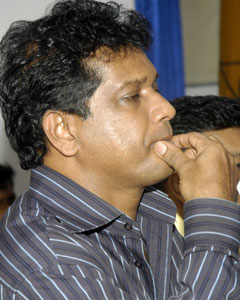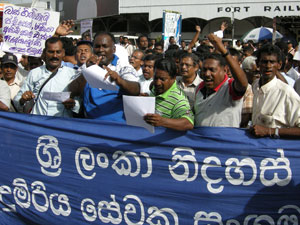The JVP’s efforts to cripple the country’s public services with a major strike, the party’s first big strike action since the government came into power four years ago, saw mixed results.
Meanwhile, many who went on strike on Thursday are feeling the effects of their union action.
In some cases, employees who went on strike on Thursday came back to work yesterday only to find their office desks and chairs missing, while others were prevented from signing in for work. In other cases, disciplinary action is being taken against strikers, while lists are being compiled at government departments and institutions of persons who took part in the general strike. In some government sectors, staff who went on strike would be deemed to have vacated their posts.
 |
| A thoughtful Lal Kantha at a news conference on the same day |
In Anuradhapura, an SLTB depot employee returning to work on Friday morning found that trade union funds kept in his custody in the office had been stolen, and that his furniture had been damaged.
Others being harassed on account of strike action were employees of the Sri Lanka Transport Board (SLTB) office in Colombo. Some staff had to stand and work all day as their desks and chairs had been either broken or removed from the office.
At the SLTB depot in Ampara, SLTB drivers who had gone on strike were not allowed to sign the attendance registers. These employees have lodged a complaint with the Ampara police.
At many SLTB depots, staff who had come to work on Wednesday were compelled to stay overnight and continue working on Thursday.
“Union members were forcibly kept at the depots by police and security forces personnel from Wednesday afternoon until Thursday evening, until the strike was over,” said All Island Transport Services Union (ATSU) president Sepala Liyanage.
Commenting on thwarted efforts by transport services staff to take part in the strike, Mr. Liyanage said the SLTB Ampara depot manager had cancelled applications for leave, while hired thugs had attempted to intimidate the trapped workers by telling them they would lose their jobs. The result, according to Mr. Liyanage, was that only 10 percent of union members took part in the strike.
Meanwhile, in other cases of intimidation, the wives of trade union leaders received anonymous telephone calls saying their husbands would be risking their jobs if they did not turn up for work.
The strike saw a mixed response from employees across the board.
Some sectors claimed the strike had not affected their services, and that in fact services were better than normal, with extra staff turning up for work, while other sectors said the strike had paralysed their services. The Government claimed that transport services across the country on Thursday were better than usual, with about 400 extra buses operating from their depots that day.
SLTB Special Projects Supervisor Jagath Perera said 4,918 buses were operational on the day of the strike, compared with 4,500 buses on normal days. “We have received reports that JVP trade unionists damaged about 12 buses and assaulted 10 workers when they found they were not getting the support they had expected,” Mr. Perera said.
While most trains were seen to be operating, Sri Lanka Railway Employees General Union president Sumathipala Manawadu said 60 per cent of railway employees had supported the strike, regardless of government intervention.
JVP MP K. D. Lalkantha, who spearheaded the strike, admitted that trains were running as usual on the day of the strike.
All Ceylon Teacher Services Union president Mahinda Jayasinghe said the government had notified schools on July 9 that teachers who failed to turn up for classes on Thursday would be deemed to have vacated their posts.
Meanwhile, a large number of minor staff in the health services sector who went on strike were replaced that day by security forces personnel brought in to carry out their duties.
Health Services Trade Union Alliance president Saman Ratnapriya said the strike was effective in 923 hospitals around the country, with a majority of minor workers staying away from work.
“Different forces were used to sabotage the strike,” Mr. Ratnapriya said. “Political thugs were sent to various national hospitals, where they threatened and even assaulted staff. Three employees at the Angoda hospital were arrested. Similar incidents were reported from hospitals in Hambantota, Trincomalee, Mannar Kalubowila and Mulleriyawa.”
National Hospital director Dr. Hector Weerasinghe told The Sunday Times that the secretary to the Ministry of Health had sent a circular asking department heads to get statements from staff explaining their absence from work on Thursday.
 |
 |
| Two sides of a protest: Health trade unions out on the road in front of the Health Ministry (L) and pro government trade unions denouncing the strike in front of the Fort Railway Station |
Some 8,000 staff of the Ceylon Electricity Board (CEB), representing 70 percent of the CEB workforce, joined the strike, according to Lanka Viduli Sevaka Sangamaya convenor Ranjan Lal. He said the strike was a success in most parts of the country.
Of the 154 employees at the Kandy city CEB office, only 12 turned up for work, while the Iriyagama depot in Kandy was completely shut down that day. In Nawalapitiya, five out of 40 CEB employees showed up for work.
According to Mr. Lal, most CEB employees had received calls asking them to report “immediately” for work on Thursday. In some cases, vehicles had been dispatched to the homes of union leaders in a bid to persuade them to come to work.
CEB general manager Ranjith Pulleperuma said no action had been taken against employees who had supported the strike, adding that it was too early to take disciplinary action.
Teachers and students marked absent
The strike action had a varying impact on services across the country. Sectors that most felt the effects of the strike were schools, hospitals, private bus operations, and also hotels and restaurants.
According to the Government, most state school teachers reported to work on Thursday, but many parents chose to keep their children at home out of fear of demonstrations and potential violence.
Most government schools in Colombo reported less than 50 percent of student attendance, while the lowest attendance that day was seen in primary schools.
Arjuna, an Advanced-Level student at a leading Colombo school, said only about half of the 40 students in each A-level class came to school on Thursday.
Mrs. Abeywardena, a Colombo teacher, said only 50 percent of the teachers in her school turned up for work, and a much higher percentage of students were absent that day.
School van driver Nayana Dharshana said only two students travelled in his van to school that day. Normally, he has 16 student passengers.
E. M. Siriwardena, a bus conductor operating in the Slave Island neighbourhood, said office workers in general turned up for work, but few students and teachers were seen attending school. “Usually we have a lot of students on our buses at peak hours. That day we had only a handful,” he said.
At the National Hospital, the Out Patients Department (OPD) was not as busy as it usually is. Patient L. Piyadasa said there was a scarcity of male attendants in the OPD ward, with female nurses being compelled to take on an extra load of work, and do duty even in the male wards.
A street vendor outside the OPD said only about 60 to 70 percent of the usual numbers that come the hospital were seen on Thursday, and his business suffered as a result. | 


